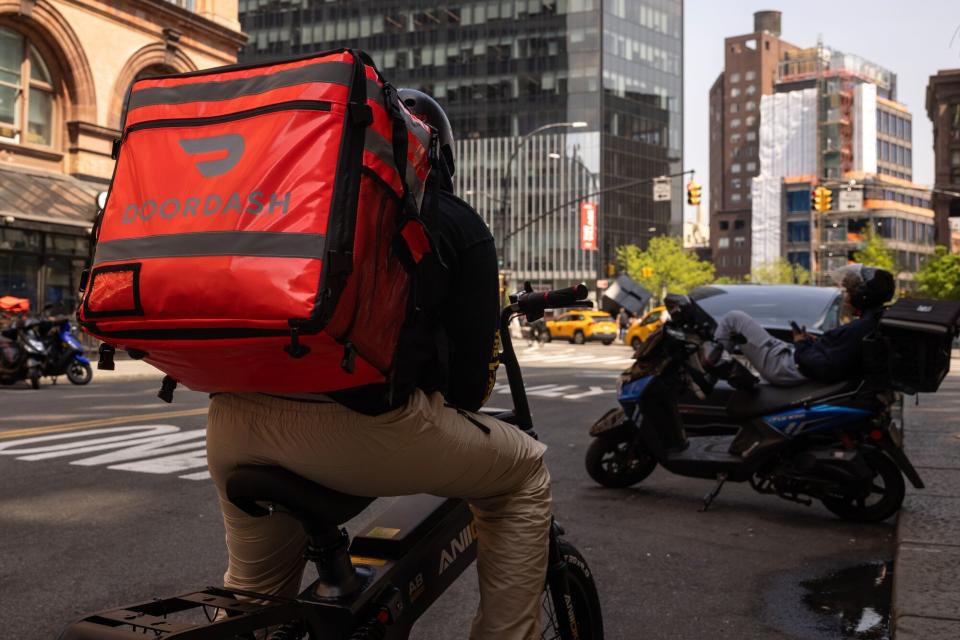New Yorkers See 58% Rise in Food-Delivery Fees

(Bloomberg) -- New Yorkers have paid 58% more in food-delivery fees since before a minimum-wage law went into effect in late 2023, according to a city agency report, suggesting that restaurant-delivery services have passed on the bulk of these rising costs to customers.
Most Read from Bloomberg
Biden Vows to Stay in 2024 Race Even as NATO Gaffes Risk His Campaign
Tesla Delays Robotaxi Event in Blow to Musk’s Autonomy Drive
US and Germany Foiled Russian Plot to Kill CEO of Arms Manufacturer Rheinmetall
While merchants also paid more fees to food-delivery services offered by Uber Technologies Inc., DoorDash Inc. and Just Eat Takeaway.com NV, the parent of Grubhub and Seamless, it is customers who are bearing the brunt of the impact. People who placed orders through such apps paid an average of $20.1 million a week in delivery fees during the first quarter of 2024 — a 58% increase from a year prior. By comparison, fees paid by participating restaurants increased 13% over the same period.
The report, released Thursday by the New York City Department of Consumer and Worker Protection, or DCWP, shows that food-delivery couriers’ overall earnings grew, even as tips fell sharply. Wages rose to an average of $19.26 an hour, an increase of 64% from a year earlier, before the minimum-pay rule became law. Tips declined by 60% in the same period.
The city’s findings underscore the impact felt by consumers and local business owners as food-delivery companies defend their margins against new regulations in various markets.
Uber Eats, DoorDash and Grubhub all responded to the new minimum-wage rule late last year by raising service fees and modifying the in-app tipping function so that the upfront delivery cost would seem lower. The companies have also implemented scheduling systems to limit the number of couriers working at a given time.
The report also found that the number of contractors delivering food fell 9% in the first quarter from a year earlier. Representatives from Uber Eats, Grubhub and DoorDash point to the decline as proof that the minimum-pay model isn’t working.
“This rule is a job killer and the antithesis of why millions of people choose app-based work,” said an Uber spokesperson, claiming that Uber Eats has 12,000 fewer workers than before the rule went into effect and that “the couriers who are still able to work need to work much harder, doing 80% more deliveries per hour than they did” before the rule change.
A Grubhub spokesperson said in a statement that “DCWP predicted in its 2022 study that couriers would earn more, but that earning opportunities would be concentrated in fewer hands,” adding that the report “shows that this is true.”
A representative for DoorDash called the minimum-wage policy “extreme and broken,” adding that the rule has led to increased costs for customers, which translates to fewer orders and fewer earning opportunities for couriers.
“We will continue what we’ve been focused on since these policies took effect — working to find a better approach that works for Dashers, merchants and customers alike,” DoorDash said in a statement.
DoorDash, the largest food delivery service in the US, downplayed the impact of new minimum-wage rules in cities like New York and Seattle in its latest earnings report, saying it saw less than a 1% reduction in orders in those two cities.
Meanwhile, Thursday’s report suggests that orders have been broadly increasing, not decreasing. Delivery workers completed about 2.8 million deliveries per week in the first three months of the year, according to the DCWP — an 8% jump from the same time period a year earlier.
“These strong results show yet again that we don’t have to make the false choice between business growth and workers’ rights, said Ligia Guallpa, the executive director of the Worker’s Justice Project, a nonprofit that lobbied for the minimum-pay legislation.
(Adds additional context in the fifth paragraph and additional comment from DoorDash.)
Most Read from Bloomberg Businessweek
Ukraine Is Fighting Russia With Toy Drones and Duct-Taped Bombs
At SpaceX, Elon Musk’s Own Brand of Cancel Culture Is Thriving
©2024 Bloomberg L.P.

 Yahoo Finance
Yahoo Finance 